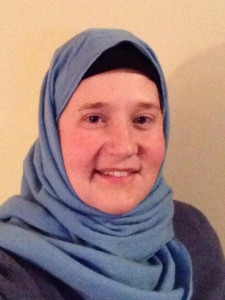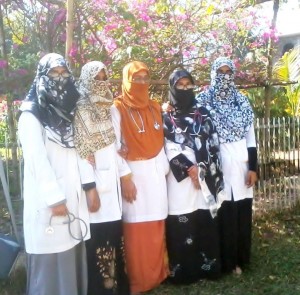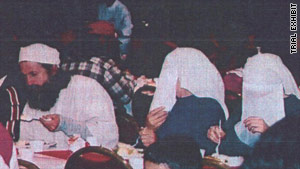Mormon in a Hijab
by Lorelei Ferre
I really love Facebook. And not just because I’m obsessed with Candy Crush, and Facebook forces my friends to send me extra moves. I largely stay out of drama and political debates, so for me Facebook is fun. I keep my geographically distant family updated with photos and cute stories about my children. I get glimpses into the lives of my childhood friends, former college roommates, and people I’ve recently met since moving across the country. Most importantly, Facebook helps me open my limited views to people and ideas literally a world away.
Two weeks ago a friend of mine from the Utah Deaf community posted a comment about World Hijab Day, so I found out more about it. World Hijab Day was founded over a year ago by a women named Nazma Khan. She immigrated to the United States as an eleven year old and subsequently endured years of ridicule, persecution, and discrimination for wearing a headscarf as part of the Muslim practice of hijab. The rules of modesty in Islam apply to men and to women, and the interpretations of the scripture regarding it vary. This FAQ from BeliefNet taught me the basics of hijab in the Muslim world. As Nazma learned more about the persecution other Muslim women faced throughout the world–including in France where girls are banned from wearing headscarves in public schools–she founded World Hijab Day as a way for Muslims and non-Muslims alike to support women’s freedom of religious expression.
When I was a BYU student 17 years ago, one of my professors told a story about when he was living in Turkey. His landlord was Muslim and one day sat him down and said, “You, should be Muslim! You pay tithes, you fast, you don’t drink alcohol, and your wife dresses modestly!” Of course my professor politely declined, but the story always remained with me. Over the years, the more I have learned of Islam, the more I see similarities with the restored gospel. There is much truth in their scripture, and the words of their prophet. I have no doubt that God inspired Muhammad (peace be upon him).
A few days after I made some Facebook posts regarding my participation in World Hijab Day, an LDS friend (who I respect very much) sent me a private message. She wasn’t negative, but she questioned why I would wear the symbol of another faith. She also thought it would be better to focus on our similarities as people, rather than our differences. Although I have felt a lot of support from my family and friends, I have no doubt that some or even many of them think this was a very strange decision. In response, I want to share this thought from “The Latter-day Saint Perspective on Muhammad” found in the August 2000 Ensign.
President Gordon B. Hinckley has consistently advocated dialogue and mutual respect in interfaith relations. He has admonished members of the Church to cultivate “a spirit of affirmative gratitude” for those of differing religious, political, and philosophical persuasions, adding that “we do not in any way have to compromise our theology” in the process. He gave this counsel: “Be respectful of the opinions and feelings of other people. Recognize their virtues; don’t look for their faults. Look for their strengths and their virtues, and you will find strength and virtues that will be helpful in your own life.”
I found this to be true once I joined the World Hijab Day Facebook page. I began to regularly read comments and stories from Muslims–mostly women–in Bangladesh, India, the Philippines, Singapore, Indonesia, Sudan, Brazil, the United Kingdom, and many other countries. My heart was touched by how proud they were with their choice to practice hijab and wear a headscarf. About one week ago, I volunteered to help with a World Hijab Day event and spoke on the phone and became Facebook friends with Salma K. Khan, sister to Nazra. One thing I noticed was how she and other Muslims frequently included Arabic phrases into almost every comment. Things like InshaAllah (If God wills), SubhanaAllah (Glory be to God), MashaAllah (That which Allah wills–appreciation), Ameen (May Allah answer–prayer). It impressed me how their faith permeates their lives each day.
Now, I consider myself to be a feminist and headscarves–with full faces in view–easily felt like a personal choice that I could support. However, when I saw this photo, I had to confront feeling uncomfortable with women with their faces veiled.
I think as non-Muslims and westerners, we have very negative associations with covered faces. We think of masked bank robbers, people who want to remain anonymous and therefore must be untrustworthy. I think LDS people in Utah may associate veiling with Elizabeth Smart’s kidnappers.
But look again at the photo of the veiled Muslim women. They are students at a medical college. They are training to be doctors in Bangladesh. That hardly seems like they are oppressed, subjugated women, does it? In fact, I read hundreds of comments from Muslim women about how wearing hijab is their choice, and how hurt they are by outsiders making judgments about that choice. I think it is time for westerners to question our own prejudices and listen, really listen, to what these women are telling us.
One reason many Muslim women like the practice of hijab is because a woman’s physical appearance is secondary to her mind and personality. I think here in the United States we are ever more a beauty- and physical appearance-obsessed culture. We place a high priority on looks, and even attribute that as the source of women’s power over men. Ergo, we assume, for a woman to veil their face, obviously a man is forcing them to forfeit the only source of their power. “Hijab must be anti-feminist,” some say. But I now believe that the opposite is true. Allowing a Muslim woman the right to choose what she wears and how she practices her religion is the ultimate form of feminism.
I’m not ignorant of the realities of female oppression throughout the world, including in predominantly Islamic countries. But mocking, assaulting, or even banning women for wearing hijab is not the solution to those complex problems. The majority of Muslim women throughout the world choose to practice hijab, even in the face of discrimination for doing so.
On February 1st, I put on the headscarf I had chosen. A few hours later, as I drove to the grocery store, I felt much more nervous than I expected. I certainly didn’t think that I would experience any outright negativity from anyone I met, at least in part because I still have white skin and don’t speak with an accent. So, why was I nervous? After all, as a Mormon I have lived in places where LDS people are only a tiny minority for most of my life. However, my Mormonhood is largely invisible unless I choose to tell someone that fact. As I drove I realized that everyone I would come into contact with will see my hijab and make assumptions and conclusions about me.
I don’t pretend for a moment that wearing a hijab for a day makes me understand the life of a Muslim hijabi. Not any more than a supermodel wearing a fat suit or a college student using a wheelchair for a day. But this was about me doing something new, no matter how far out of my comfort zone it was. At the store, I felt that most people treated me normally. I think, although perhaps I was overanalyzing, that two separate women seemed to intentionally look away from me. Whereas two men were unusually friendly to me. Could it be the women were more uncomfortable to see a veiled woman than the men were?
Because I didn’t feel well, the rest of my day in a hijab was spent at home caring for my children. The main thing I noticed was how wearing a hijab changed me on the inside. It felt wrong to be angry with my children, to yell at them while wearing a hijab. I tried to be more patient and calm. I wished that I was familiar with the phrases to ask God for support in interacting with my children positively, interspersed as easily as my Muslim friends did in their own thoughts. Wearing a hijab for a day made me think more about faith and God, to realize that I need and want to incorporate Him more fully into my daily life.
The LDS Church has recently started an initiative to support religious freedom. In their official statement they say, “Religious freedom, or freedom of conscience, is critical to the health of a diverse society. It allows different faiths and beliefs to flourish. Religious freedom protects the rights of all groups and individuals, including the most vulnerable, whether religious or not.” What better way to follow the prophet than to support our Muslim sisters in practicing their religious principles? As Mormon women we have more in common with our Muslim sisters than most. After all, we do practice modesty and wear special articles of clothing that represent a maturity in the faith. How would we feel if everyone we met stared at us with pity, assuming we were forced into covering our shoulders by domineering fathers and husbands? What would we do if a young woman attending prom had the sleeves ripped off her dress because it made people uncomfortable? I suggest that LDS women throughout the world seriously consider participating in World Hijab Day next year, February 1, 2015, which will be a Sunday. As President Hinckley said, “we do not in any way have to compromise our theology” when we honor other religions.
As February 1st dawned in the eastern world, two other LDS sisters posted their photos on the World Hijab Day Facebook page. One received over 3,200 likes and the other more than 3,700. In the comments myself and others pointed out that some Mormon beliefs and practices are similar to Islam and we respect them. To me, this was a marvelous opportunity to build bridges and open hearts to people who probably had never heard of the Church of Jesus Christ of Latter-day Saints, or who assumed we were just like all other Christian sects.
I am so grateful that I had this marvelous opportunity and a whole new world opened up to me. Diversity is a buzzword these days, but I truly love our differences. God made his children unique in so many ways. I don’t think we need to assimilate in order to love one another. The World Hijab Day motto is “Better awareness. Greater understanding. Peaceful world.” While I have respected Islam for many years, I now actually have Muslim friends on Facebook. One of them is a woman who lives in Mecca, Saudi Arabia. How amazing is that? And you know what? She plays Candy Crush, too.




I converted to islam and live now for 15 years in a muslim country. I have to say I do not remember to have encountered here anyone having such a cerebral and nuanced way of expressing themselves like you.
More something between pathological sectarian certainty on one side or unimaginative imitation of “progressive” liberalism on the other.
In view of my offspring (eight), it rather worries me that my own spark of consciousness will either drown in this particular flavor of mediocre thought here or be led astray by the statistically probable end of a western trajectory.
Oh dear, you say you consider yourself a feminist. Given what that mostly means by a large margin, do you want to like recoin the term? That would be ok. But consider how much exterminating suffering feminism has wreaked on men who terminally lost contact with their children (custody jurisdiction).
I have three wives. Are there still mormons who see the blessings of polygamy?